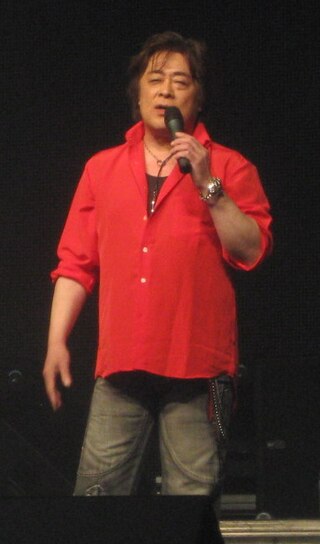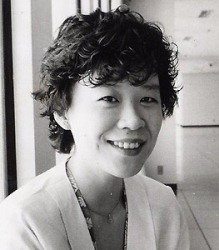
Ren Osugi, born Takashi Osugi was a Japanese actor. For his work in Cure, Hana-bi and other films, Osugi was given the Best Supporting Actor award at the 1999 Yokohama Film Festival. He often worked alongside Takeshi Kitano and Susumu Terajima. In the DVD commentary to the MPD Psycho television series, director Takashi Miike said that he admired Osugi's experience to shift quickly from comic and imbecilic to authoritative and earnest. He died of heart failure at the age of 66 on February 21, 2018.
Sanma Akashiya is a Japanese comedian, TV presenter, radio personality and actor most commonly known as Sanma-san. His real name is Takafumi Sugimoto. His talent agency is Yoshimoto Kogyo and his shishô (master) back when he studied rakugo is Shōfukutei Matsunosuke.
The Alfee is a Japanese rock band formed in Tokyo in 1973. Originally a folk quartet, they became a trio of bassist Masaru Sakurai, acoustic guitarist Kohnosuke Sakazaki and electric guitarist Toshihiko Takamizawa in 1975. With all three performing vocal duties, they adopted a harder rock sound in the early 1980s. Beginning with their 16th single "Marie-Anne" in 1983, they have released 58 consecutive top 10 singles. The Alfee hold the record for most concerts performed by a Japanese band, with 2,888 as of December 2023. HMV Japan ranked them number 92 on their list of the top 100 Japanese pop acts.
Yasutaka Tsutsui is a Japanese novelist, science fiction author, and actor. His Yumenokizaka bunkiten won the Tanizaki Prize in 1987. He has also won the 1981 Izumi Kyoka award, the 1989 Kawabata Yasunari award, and the 1992 Nihon SF Taisho Award.
Kazuo Oga is an art director and background artist for many Madhouse Studio and Studio Ghibli anime films. Oga has worked with major directors Hayao Miyazaki, Isao Takahata, Yoshiaki Kawajiri, Osamu Dezaki. He also published two artbooks and directed a short animated film.

Hironobu Kageyama is a Japanese musician, singer and composer. He is best known for his work on anime, video game and tokusatsu soundtracks. Kageyama first rose to prominence as a teenager in the 1970s as lead singer of the rock band Lazy. Following their breakup in 1981, Kageyama began a solo career. He struggled until finding major success in the mid-1980s, when he started singing theme songs for anime and tokusatsu television shows. The music to such programs is called anison in Japan, and Kageyama became immensely popular, earning the nickname "Prince of the Anison World".

Takayuki Miyauchi, is a Japanese singer best known for his work on theme songs for tokusatsu and anime. A resident of Ibaraki Prefecture, he began his career as founding member and lead vocalist of the band "WHY" in 1981 before making his solo debut in 1984, singing the opening theme for the "Super Sentai" tokusatsu television series Choudenshi Bioman.
Chōhei Kambayashi is a Japanese science fiction writer.

Shin'ichirō Nakamura was a Japanese author.
Junko Sakurada is a Japanese singer and actress. She was part of a music trio in 1973, which included Momoe Yamaguchi and Masako Mori. Sakurada then became successful in a solo music career, with 18 top ten singles in the 1970s. Her acting career ran from 1973 to 1993. She received multiple awards for her acting roles, including the Hochi Film Award, Award of the Japanese Academy, Kinema Junpo Award, and Mainichi Film Concours. Following her marriage, in a Blessing ceremony of the Unification Church in 1992, she retired from performing. In 2013, Junko Sakurada made a comeback.
Kaori Utatsuki is a J-pop singer who is signed to Geneon Universal Entertainment. She is a former member of the music production group I've Sound based in Sapporo, Japan. She has performed several songs for eroge together with the other I've Sound members. In August 2007, she released her first maxi single under Geneon Universal Entertainment titled "Shining Stars Bless," which was used as the opening theme for the anime Nanatsuiro Drops.
Shingo Tsurumi is a Japanese actor.

Saeko Himuro was a Japanese novelist, essayist, and playwright born in Iwamizawa, Hokkaidō Prefecture, Japan. During the 1980s and 1990s, she was one of the most popular authors released under Shueisha's Cobalt Bunko imprint. She is best known outside Japan for I Can Hear the Sea, later a Studio Ghibli movie. The cause of her death was determined as lung cancer.
Masaki Kyomoto is a Japanese actor, singer-song writer, and guitarist. He is famous for playing the role of Ryu on the television jidaigeki Hissatsu series.
Kenzo Kitakata is a Japanese novelist, especially known for his hardboiled novels. He studied law at Chuo University in the early 1970s. He served as the 10th President of the Mystery Writers of Japan from 1997 to 2001.

Kamaitachi (かまいたち) was a Japanese visual kei punk rock band, formed in Kyoto and active from 1985 to 1991. Their album Hachamecha Kyou reached number 10 on the Oricon chart and was named one of the top albums from 1989 to 1998 in a 2004 issue of the music magazine Band Yarouze. They have performed several times since reuniting for a one-off performance in 2015.

Elves of the Forest is a Japanese anime television series produced by Zuiyo and animated by Shaft. It was originally broadcast on Fuji TV for 23 episodes between October 5, 1984, and January 1, 1985.
Mikihiko Renjō was a Japanese writer, winner of the Naoki Prize. He was also an ordained priest within the Ōtani-ha branch of Jōdo Shinshū Buddhism.
Kahoru Kohiruimaki is a Japanese singer who debuted in 1985. She had great success in the next ten years with around thirty singles, fifteen original albums and various compilations. Kohiruimaki is the most well known in the West for the song "Ai yo kienaide", the first opening theme song from the anime series City Hunter in 1987, and for the ending theme song for the OVA Gall Force in 1986.
Sasazawa Saho was a Japanese author, known as the creator of the Kogarashi Monjirō novels, which became a hit televised drama series.





